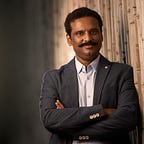Personal Growth Formula
We’ve heard the age old debate on “Hard work vs Smart work” and which holds the key for success. I doubt it will ever be settled. Maybe the problem is the binary thinking it forces upon you, but I’m not going to force you to choose. In fact I’m going to make them both work for you.
We’ll do that by focusing on something far more crucial and much less talked about. This is especially true when it comes to the growth from a rockstar individual performer to a leader who builds a rockstar team. Something we assume should happen naturally and are surprised everytime it doesn’t.
I am talking about vulnerability. I am well aware that for strong, highly driven leaders this can evoke a very soft, touchy feely or seem to expect a more than needed personal approach to professional relationships. All this can make it very tempting to dismiss it out of hand. But hear me out as I make my case not in the abstract but from close to 2 decades of starting and running a company.
This formula signifies how one’s intelligence and hard work creates a multiplier effect in terms of the results or impact that one can create. This is especially true in the early stages of one’s career where it’s more of individual contribution. The need for vulnerability is also less, one’s relative inexperience is actually a protective layer.
As one grows to take on more responsibilities (people, projects) and starts collaborating with an increasing number of stakeholders, difficult conversations are needed and choices have to be made. The extent to which one is willing to be open, seek to understand, suspend judgement, etc — in other words, choosing to be vulnerable will decide how that relationship will play out in the long run. This will also set the tone for the team and the company over time. Hence it is something that quite literally (and mathematically) has a divisive effect. This tends to derail the overall outcome despite the superior talent and drive of the individuals involved.
Before going further, it’s important that we have a common understanding of what we mean by vulnerability in a professional context. To me it starts with saying simple things like: “I don’t know”, “I made a mistake”, “I disagree”, “I might be wrong”, “I have a concern/ idea”. It can extend upto giving someone the benefit of the doubt (no matter how credible the initial accusation seems) and giving folks an extended opportunity to turn things around.
Needless to say, simple does not mean simplistic or easy. It is not just about being humble or self aware, but also about having the courage to openly share our doubts, lack of knowledge or clarity in certain areas. It’s about being our real selves, exposing our ideas to criticism, judgement and maybe even ridicule. Unpleasant as it may be, these short term experiences might actually be necessary for us to make our ideas more impactful. We shorten the trial and error process, we get to failure quickly (maybe even avoid some) and get to work on ideas that create impact.
This also is a great way to build trust within the team by role modelling to them that it’s not just ok, but also expected to make mistakes, admit ignorance and question others.
The other key benefit of vulnerability is that it cuts down on being “political”, which in an office setting we define as, “saying or doing things based on what we want from others as opposed to what we really think or believe.” When one has created an environment where it is ok to be vulnerable, we also give people the confidence that disagreements, arguments arise out of a genuine intent to do what’s best for the group and not about putting down or blaming any single individual or team. We become less worried about protecting our turf and focus on nurturing it, peers become collaborators not competitors, we are less worried about personal status and more focused on team outcomes.
More than any of this, it’s been my experience that as expectations mount over time, being vulnerable reduces the stress of having to project an image of someone who has all the answers and can deliver on all the responsibilities single handedly. We can be our authentic selves, seeking support when needed and building genuine relationships with our people that makes them better and happier human beings at the end of the day.
Being vulnerable is hard. Who said exponential benefits will come easy!
